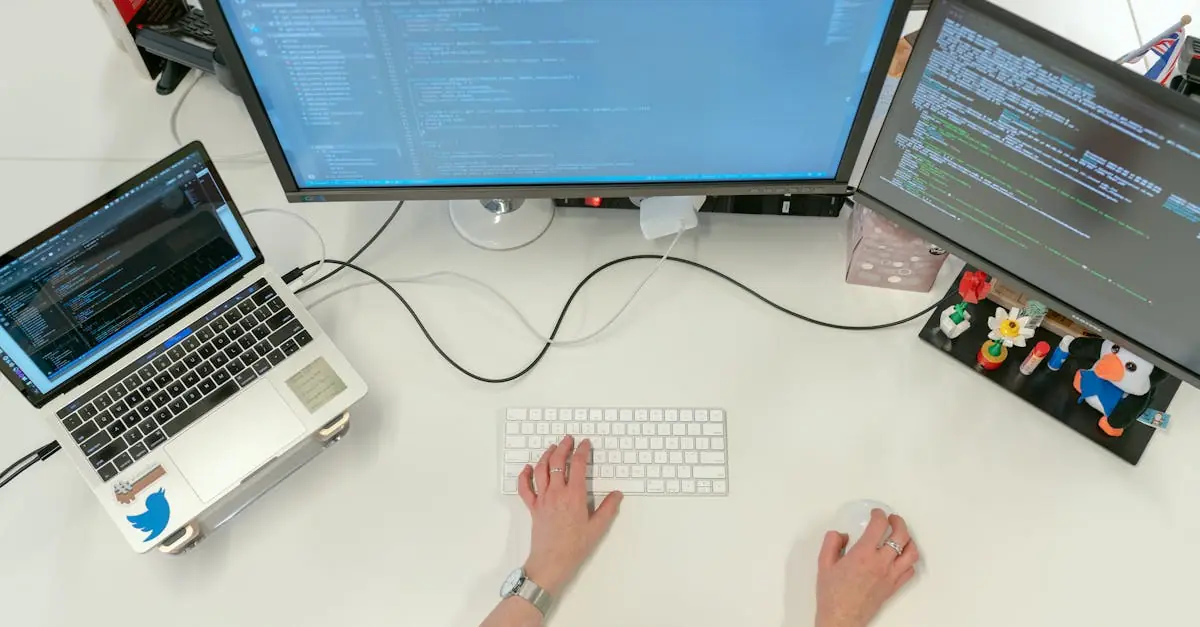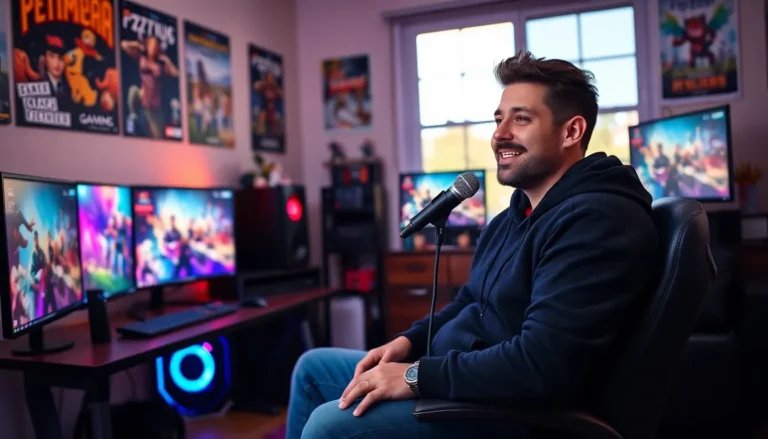In the competitive world of software engineering, a stellar cover letter can be your secret weapon. It’s not just a formality; it’s your chance to charm hiring managers and showcase your personality. After all, who wouldn’t want to hire a coder with a sense of humor?
Crafting the perfect cover letter is like debugging your code—one small mistake can lead to a world of frustration. But fear not! With the right tips and tricks, you can transform your cover letter from a bland block of text into a compelling narrative that highlights your skills and passion. Let’s dive into the art of writing a cover letter that not only gets noticed but also gets you that coveted interview.
Table of Contents
ToggleImportance Of A Software Engineering Cover Letter
A software engineering cover letter serves as a critical tool in the job application process. It allows candidates to present their technical skills and personal traits to hiring managers. Personalized content in a cover letter can differentiate an applicant from others with similar qualifications.
Cover letters help convey enthusiasm for a specific role or company, signaling genuine interest in joining the team. Demonstrating knowledge about the organization’s projects or values can create a positive impression. When tailored appropriately, a well-structured cover letter reflects an applicant’s understanding of the industry.
Formatting is crucial; a neat, professional appearance should grab the reader’s attention. Engaging language can invite further interest, urging hiring managers to review resumes carefully. Specific examples of past projects can illustrate relevant experience and problem-solving abilities effectively.
Highlighting soft skills alongside technical competencies presents a well-rounded candidate. Communication skills, teamwork, and adaptability are essential attributes for software engineers. Including these personal qualities can enhance perceptions of a candidate’s fit within a collaborative environment.
Concise writing reflects clarity of thought and respect for the reader’s time. Demonstrating efficiency in communication mirrors the software development process itself, where clarity and precision lead to successful outcomes. In competitive job markets, a strong cover letter increases the likelihood of securing interviews and moving forward in the hiring process.
Key Components Of An Effective Cover Letter
An effective cover letter contains essential elements that can significantly enhance an application. Prioritizing these components strengthens the chances of impressing hiring managers.
Personalization And Tailoring
Personalization sets a cover letter apart. Addressing specific hiring managers by name shows attention to detail and genuine interest. Each letter should reflect knowledge about the company’s culture and values. Referencing recent projects or achievements highlights alignment with the company’s goals. Demonstrating an understanding of the job requirements signals readiness to contribute immediately. Tailored content resonates more with readers, making the letter memorable.
Technical Skills Highlight
Highlighting technical skills showcases relevant competencies directly linked to the job. Identifying key technologies mentioned in the job description ensures alignment with the employer’s needs. Discussing programming languages, frameworks, or development tools emphasizes proficiency. Clear examples illustrating past accomplishments solidify credibility. Presenting skills confidently draws attention to the applicant’s capabilities, reinforcing their fit for the position.
Projects And Experience
Detailing projects and experiences enriches a cover letter’s narrative. Including specific examples of past work demonstrates applied knowledge in real-world scenarios. Summarizing relevant projects, such as software developed or challenges overcome, illustrates problem-solving abilities. Metrics or outcomes serve as compelling evidence of success. Effectively communicating these experiences forms a strong connection to the prospective role.
Common Mistakes To Avoid
Crafting a software engineering cover letter demands attention to detail. Avoiding common mistakes can significantly enhance its effectiveness.
Generic Language
Using generic language fails to make a strong impact. Phrases like “I am a team player” lack specificity. Instead, candidates should provide concrete examples that showcase their collaboration skills. Personalizing the cover letter by incorporating specific experiences or roles can set an applicant apart. Tailoring the message to align with the company’s values strengthens the connection. Emphasizing unique contributions, such as leading a project that improved efficiency or a specific achievement, resonates well with hiring managers. A cover letter that feels personal rather than generic engages the reader better.
Poor Formatting
Formatting plays a crucial role in conveying professionalism. Subpar formatting can detract from an otherwise impressive cover letter. Use clear headings and consistent font styles throughout the document. Inconsistent spacing or misaligned text generates distractions and diminishes clarity. Additionally, proper paragraph breaks enhance readability. Avoid large blocks of text; instead, opt for concise paragraphs and bullet points when listing skills. A well-organized cover letter increases the chances of capturing hiring managers’ attention. Prioritizing clean formatting reflects attention to detail and respect for the reader’s time.
Tips For Writing A Standout Cover Letter
Crafting a standout cover letter requires attention to detail and a focus on relevance. Focusing on the company’s culture and values offers a foundation for tailoring applications effectively.
Researching The Company
Understanding the company boosts the impact of a cover letter. Investigate the organization’s recent projects and technological innovations. This knowledge allows the applicant to align their skills with the company’s goals. Examine the company’s mission statement and values for insight into their organizational culture. Candidates can mention specific initiatives that resonate personally. This targeted approach highlights genuine interest and strengthens the connection with hiring managers.
Showcasing Your Passion
Demonstrating enthusiasm for the role captivates hiring managers. Candidates can recount how their interests align with the company’s projects. Highlighting personal experiences can convey passion effectively. Sharing stories about past challenges and solutions illustrates dedication toward the software engineering field. Engaging language that reflects excitement about specific technologies or methodologies makes the narrative engaging. Ultimately, passion is contagious; it can leave a lasting impression, making candidates memorable and impactful.
Crafting a standout cover letter is essential for software engineering candidates. It’s not just about listing qualifications but about telling a compelling story that resonates with hiring managers. A personalized approach can set an applicant apart in a crowded field.
Attention to detail in formatting and language enhances professionalism and readability. By showcasing relevant experiences and soft skills alongside technical expertise, candidates can present a well-rounded image.
Ultimately, a thoughtful cover letter reflects genuine enthusiasm for the role and the company. This passion can significantly increase the chances of making a memorable impression and securing that coveted interview.





